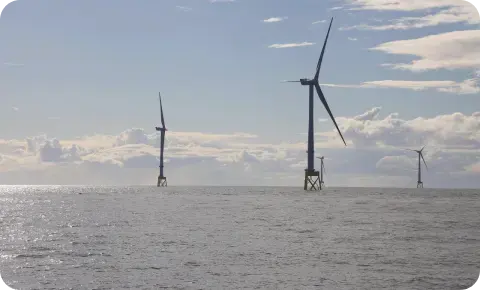
Meeting the french and european energy needs
Natural gas: an essential component of the French energy mix
Natural gas represents around 15% to 20% of the French energy mix and covers around 40% of heating consumption in France. Natural gas is a natural complement to renewable energies that are by nature intermittent and seasonal. For example, in the event of a drop in electricity production due to lack of wind (wind farm) or lack of light intensity (photovoltaic panels), a gas plant can be mobilized very quickly to produce the electricity that will compensate for this decrease.
Natural gas is versatile:
- Energy source for large industrialists (cement works, steel plants, waste incinerators, petrochemical plants, etc.)
- Energy source for electricity and heat production
- Energy source for craft and tertiary activities (bakery, glassware, etc.)
- Energy source for residential needs (heating, cooking, etc.)
- Raw material for the fertilizer and chemical industry
- etc
Primary energy consumption varies greatly depending on the season. Thus, energy needs are much higher in winter due, in particular, to the energy consumption required for heating. During the last cold winters, gas provided up to 50% of peak energy needs. The great flexibility of gas use and the existing storage capacities allow it to play an essential role in the energy mix of today and tomorrow in France.
Access to abundant and affordable energy: a vital necessity

The shortage of natural gas following the sharp drop in Russian gas imports through pipelines materialized in the surge in gas prices from mid-2022. The consequences on economic activity in France have been significant with the decline or even the cessation of production of many industrial sites (steel, glass, etc.) but also the jeopardizing of the viability of craft activities (bakery, etc.).
FSRUs in support of the European market
Following the outbreak of the conflict in Ukraine at the beginning of 2022, the floating storage and regasification units (FSRU) were the object of all the desires of European countries. They are a rapid response to the risk of disruption in the supply of natural gas transported by pipeline.
Among the fifty FSRUs currently in service worldwide, Europe has managed to mobilize in record time two FSRUs in the Netherlands, three FSRUs in Germany, one FSRU in Finland and one FSRU in France (in Le Havre), not to mention the ongoing projects in Italy (three FSRUs planned to enter service by the end of 2023), Germany (two additional FSRUs by the end of 2023), Greece (one FSRU), etc.
TotalEnergies has two FSRUs in its fleet: the "Cape Ann» destined for the port of Le Havre and the "Neptune" which was moored in Lubmin, north-east Germany and entered into operation there in January 2023.
LNG : TotalEnergies, a global and integrated player
Lean moreA necessity to secure gas supplies
The mobilization of an FSRU in France aims to contribute in the short term to the challenges of diversification and security of gas supplies to meet demand and avoid a surge in prices. In 2021, Russia accounted for 17% of French natural gas imports by pipeline, the FSRU "Cape Ann", a new LNG import point in France, will have the capacity to cover approximately 60% of this quantity.
FSRUs offer a flexible, fast and reversible solution. Thus, the law of August 16th, 2022 on emergency measures for the protection ofpurchasing power, provides in article 30 for a maximum operating period of the floating LNG terminal of five years.

